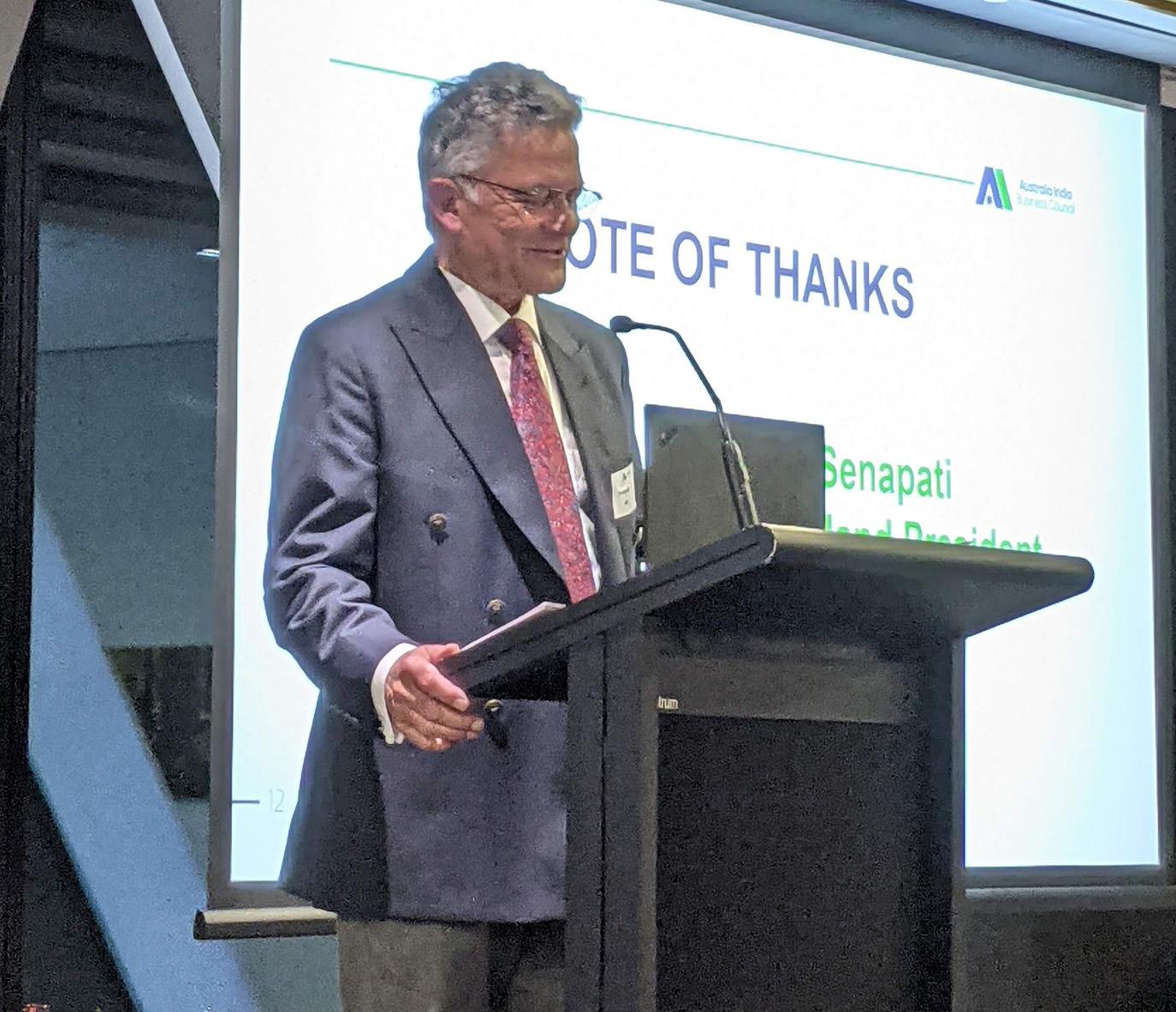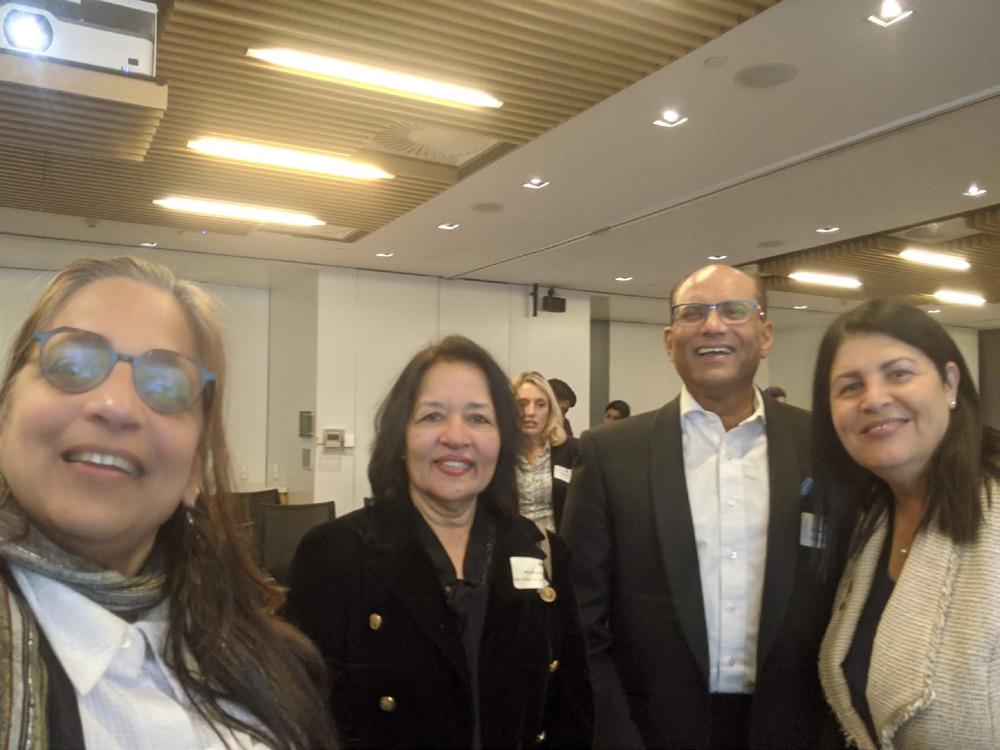
5 minute read
Education Minister Ms Grace Grace MP speaks about her visit to India
Written by Amrita Deshpande, Community News Editor, Australia India News
In a forum organized by the Australia India Business Council for its members and community leaders, Minister of Education
Advertisement
Ms Grace Grace addressed the community about her experiences in India and the connections she was able to establish while in India.
She says she was extremely impressed by Prime Minister Modi and reiterated the phrase she likes that ties Australia and India together the three C’s “Cricket, Commonwealth, and Curry”. In her observation of Delhi’s traffic she said “if you can drive in Delhi you can Drive anywhere in the world”
Ms Grace Grace expressed that the reason for her to visit India was because the education department wants to get Queensland on the radar of India so as to bring Indian students to Australia and establish stronger ties between educational institutions in India and Queensland. Australia is currently banking on the role of education in sports and Queensland has a lot to offer. With the Olympics and Paralympics happening in Brisbane, sports schools are being developed in Australia and India is definitely interested in the sports training and competitions integration in educational institutions incorporating the Interstate as well as the Interschools models. India also has an ambition to get the Olympic bid for 2036, hence the ties are necessary not only for the economic boost but also to learn from Australia’s experience for Olympic bid to its implementation.
Minister Grace Grace appreciated the efforts put in by Abhinav Mishra in establishing the ties with Indian educational institutions as well as businesses which had not been done before. Australia is interested in collaborating with primary and secondary schools in India as well as the Kindergartens. She says “ Both country’s educational institutions can learn from each other and establish an educational model that gives holistic experience and knowledge gain.” She was surprised to know that educational institutions in India were shut for face to face learning for more than a year during the COVID pandemic. India had to resort to the online education model innovating through the digital framework.
In her various interactions with experts in the field, the ministers, and community leaders she said the interests was mainly in knowing the strategies for equity and excellence in education. Problems that both countries face are not very different and both can learn from each other in resolving those problems as well as implementing the best strategies for both countries.
In conclusion of her speech
Minister Grace thanked the AIBC for organizing such forums which gives opportunities to interact with community leaders in Brisbane where exchange of fruitful conversations is possible. In regards to her trip to India she says it was one of the excellent business trips she has been on and cannot wait to go back to India again. She loves the weather of Delhi and Ahmedabad and says its nothing different from Australia . She is looking forward to more opportunities and stronger connections with India. The forum also featured a panel discussion with Sahra Richardson (Asia Education Foundation AEF), Shashank Vuppala (Associate director at Queensford College and Axis Institute, and Brett Lovegrove (Pro-Vice Chancellor Global Partnership University of Queensland).
Each of the panelists summarised their efforts in establishing connections with India and gave an overview of the scenario currently happening in establishing those connections. A few thoughts that were expressed were that Australia needs to support students and gain knowledge about ASIA.
There needs to be a stronger Partner with Schools and Countries program
A sound virtual model must be used to connect online professional schools programs.
Agecare training is needed
The visas need to be increased and be easier for teachers to go to India
Vocational education needs are higher, we are just scraping on the top, there is lots of potential for a volume of business coming through from India.
Queensland has a unique sense of education which is of interest for India
100000 students migrate to Queensland but the growing diaspora needs to recognise the opportunities there are in Australia for education.
Australia has decreased the carbon emissions and there is an increase in the jobs in education sector.
ECTA has facilitated the Aus India Economic Strategy and built the Aus India relationship in education sector as well established connections with




University grants commissions
There is an increase in travel to India for educational purpose from Australia and Universities must also establish themselves in India.The IIT Delhi engages 110 phd students. Students from Australia are currently working on thesis projects such as the Bio fuel from sugarcane, green hydrogen solutions and looking at the steel plants in India.
A comprehensive education is the need, a common price point must be resolved to attract students and teachers.
Australia must learn how to work with India as India’s literacy level is challenging, the north and south divide and cultural differences in India must be taken into consideration.
India’s Educational Institutions are currently looking for tie ups to improve their student’s opportunities to get the best of education possible. Hence a lot of MOU’s are being signed with various Educational Institutions worldwide. India’s population demographics shows that India will have largest young population, more than 50% of its population is below the age of 25 and more than 65% below the age of 35 and Australia must grab this opportunity and establish those stronger ties with Indian Educational Institutions.
New Delhi, July 8 (IANS) Keeping your heart healthy is crucial for overall well-being and longevity. While there are various factors that contribute to heart health, including lifestyle choices and genetics, incorporating the right oils, managing salt intake, and engaging in regular exercise can significantly contribute to maintaining a healthy heart. However, in the pursuit of a healthy heart, people often find themselves bombarded with conflicting information, such as what should they opt for -refined oils, ghee, or butter or what type of exercises are truly beneficial for their cardiovascular health?
"When it comes to oils, many have touted the benefits of switching to refined oils. However, emerging research suggests that the age-old tradition of using ghee or butter might not be as harmful as once believed. These natural fats, consumed in moderation, can offer vital nutrients that support heart health," Dr Haresh G. Mehta, Consultant-Interventional Cardiologist, SL Raheja Hospital,
Mahim-A Fortis Associate told IANS.
While refined oil is the best, experts suggest people should choose oils that are MUFA-rich and high in omega-3 fatty acids like rice bran oil, canola oil, and olive oil.
Moreover, to keep the heart healthy people are advised to eat heart-friendly food which is high in complex carbs, with healthy proteins & fats, such as millet, oats, brown rice, lentils, eggs, lean meats like chicken, fish, a lot of nuts and seeds as they are high on omega 3 fatty acids.
However, for a healthy heart, it is advised to reduce the intake of fried foods, simple sugars, and high-calorie sweetened beverages.
The debate over which type of salt to use has gotten a lot of attention.
"While many advocate for lowsodium options, recent studies suggest that a moderate intake of iodized or sea salt may offer essential trace minerals that are beneficial for cardiovascular wellbeing. The key lies in moderation and avoiding excessive salt consumption, regardless of the type," Mehta said.
According to doctors, the hidden sources of salt which cause major concern are baking soda, pickles, papads, and packaged foods as they are very high in sodium.
As for exercises, the best approach involves a combination of cardiovascular workouts and strength training.
"Exercise is key in the management of heart disease, one should have an active lifestyle. Incorporate both forms of exercise which are aerobic and anaerobic forms, like walking, yoga, swimming, cycling etc," Ritika Samaddar, Chief Dietitian, Max Healthcare, told IANS. Engaging in activities like brisk walking, swimming, or cycling improves heart function and boosts overall fitness.
Further, Samaddar advised that people should avoid very heavy and strenuous exercise, especially if one has a history of cardiac issues.
About 30-45 mins of exercise daily is recommended by experts, plus doing meditation or yoga is also recommended as it helps to reduce stress -- a major causative factor for heart disease.
According to doctors, the quest for a healthy heart demands a nuanced understanding of the choices people make. While refined oils, ghee, butter, different salts, and exercises can all play an essential role -moderation, informed decisions, and professional guidance remain the key pillars of maintaining cardiovascular well-being.










